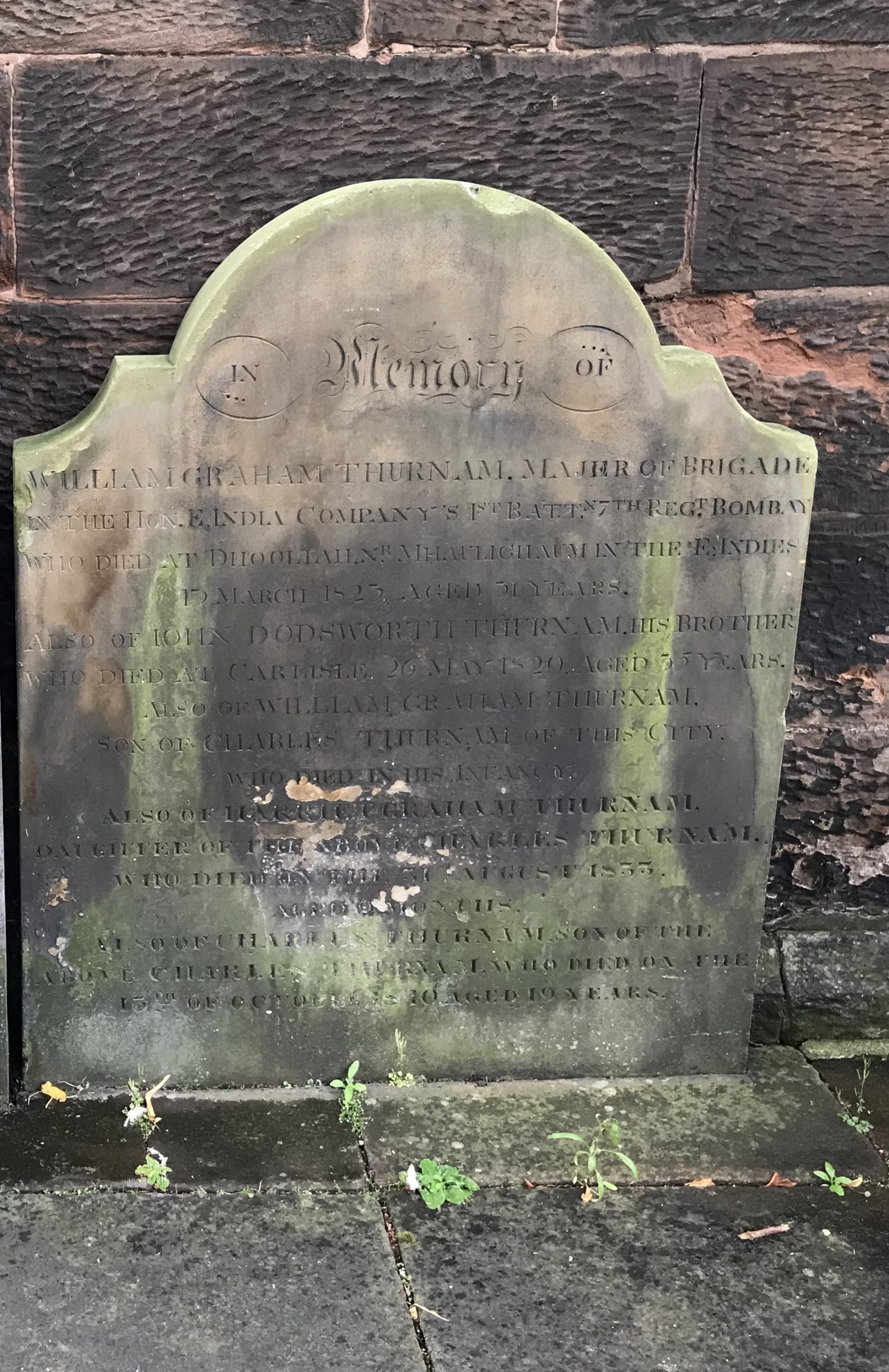Thurnam brothers, Carlisle
Like Goldilocks, sometimes there is too little information on an individual to make a blog post. Sometimes, there is just enough. And sometimes, there is too much.
In the case of the Thurnam brothers, it’s the first and last of those three.
Charles Hutchinson Thurnam is well-recorded elsewhere, so Cumbrian Characters can’t really add anything to that.
Born in Edinburgh in 1796, he was the son of surgeon Timothy Thurnam and (Cumbrian) Dorothy Graham.
Charles Hutchinson Thurnam became a stationer in Carlisle, before setting up a circulating library, that let paying subscribers borrow books.
You can read a lot about Charles Hutchinson Thurnam here.
The site says does contain (at least) one error. For it says ‘ his brother Timothy became a surgeon in the Army,’ but died in 1798, aged 28, when the ship carrying him to India sank.
This was in fact Charles’ FATHER.
For sure, Charles Hutchinson Thurnam had two brothers William Graham Thurnam (b.1792) and John Dodsworth Thurnam (b.1794).
The family grave
It has to have been Charles Hutchinson Thurnam who put up the gravestone at St Cuthbert’s Church, Carlisle.
It names:
- William Graham Thurnam
- John Dodsworth Thurnam
- as brothers of Charles. And then two of Charles’ children (by wife Ann Graham):
- Harriet Graham Thurnam, who died in August 1833, aged nine months, and
- Charles Thurnam, who died in 1840, aged 19.
John Dodsworth Thurnam
And here we get the Goldilocks ‘too little information’. John was born in 1794, and died in Carlisle on May 26, 1829, aged 35 years.
And that’s about it.
William Graham Thurnam
William gets us a little further. But not much.
The gravestone says he was Major of Brigade in the East India Company’s 1st Battalion, 7th Regiment, Bombay. And that he died at Dhooliah, near Mhaulighaum, ‘in the East Indies,’ in March 1823, aged 31.
Although he died in March, news didn’t reach the British press until September. Does that mean his family didn’t know he’d been dead for six months either?
In camp, at Doolia, on the 13th of March, Brevet Captain William Graham Thurnam, of the 7th Bombay Regiment of Infantry, and Brigade Major to the forces at Malligaum. The death of this brave and excellent officer will be regretted by the whole army; the service has lost a most distinguished member, and his numerous friends a most honoured and pleasant companion.
Bombay Government Gazette.
You would think there might be more about his death. But all I’ve been able to find is accounts of his bravery two years earlier, in Oman, when:
‘he cut down four fellows and behaved excellently’
The attack at Beni Boo Ali
The occasion for William’s ‘excellent behaviour’ was part of the The Bani Bu Ali expedition (1820–21) –
a punitive campaign launched by the Sultan of Muscat and the East India Company against an Omani tribe known as the Bani Bu Ali.
Apparently this wasn’t simply another case of bad British colonialism: the Bani Bu Ali were engaged in piracy. And the British used the treaty with Oman to put pressure on the sultan to end slavery.
The Bombay Gazette recorded the fight at the time:
‘the Enemy opened from the 18 pounders which they had taken from the detachment of Capt Thomson.. the Arabs kept up smart fire… the Enemy were routed…
‘No men could have fought more nobly, five hundred have been killed or wounded, out of a thousand.’
This included:
‘Mr. Gordon, surgeon, is cut to pieces. Capt. Stewart severely wounded in the head. Lieut, and Adj. Thurnam is wounded, but not dangerously: he cut down four fellows, and behaved excellently.’
Along with a line that is also ‘jolly good show, what?’ in tone (with a touch of Corporal Jones from Dad’s Army!)
‘Our loss has been rather severe, but we have taught them a lesson they will not soon forget’.
William’s will
William Graham Thurnam wrote his will on the ship the Duke of Bedford ship, at sea. on January 22, 1821.
He left all his Cumbrian property to his brother Charles. With an annuity of £35 to brother John.
The will was proved in June 1823, in Bombay, so hopefully the family did learn of his death before September.
A marble tablet, with his likeness, made by John Kirkbride, was put up inside Carlisle Cathedral. Above
the medallion are the words : —
” Some kindred spirit shall enquire thy fate.”
I couldn’t find anything like it, sadly.
Over-working is bad for you
Charles named a son William Graham Thurnam – he was baptised in 1836, in St Cuthbert’s Church.
He died in Rome in 1859, aged 23. He’d gone there ‘last winter,’ with his eldest sister, for the benefit of his health (by the advice of an eminent physician).
‘His strength has been much impaired by too close application to the onerous duties of a large and increasing business.’
‘Up to a few days before his death he had been looking forward with pleasurable anticipation to his return to England. but he sank somewhat suddenly under an attack of illness from which there was every reason to hope he would recover.
Carlisle Patriot, 21/5/1859
Footnote:
The Families in British India Society shows two entries for William Graham Thurnam. Anyone interested would need either a subscription to Find My Past to read online, or be able to visit the British Library in London.

